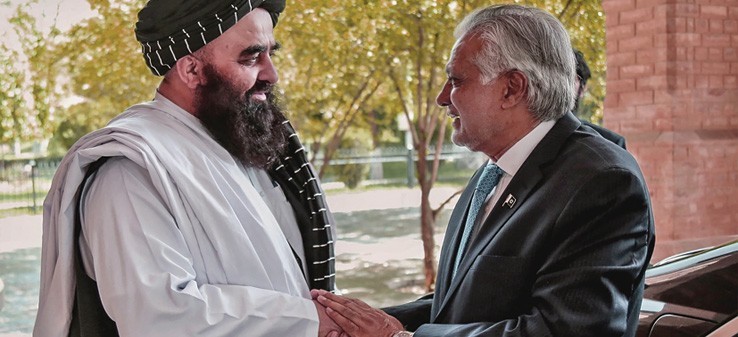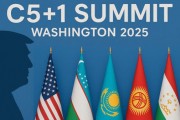Publish Date
Tuesday 8 July 2025 - 14:09
recommended
1
Why Kabul-Islamabad relations need to improve
The Improvement of Pakistan–Taliban Relations; Factors and Reasons
The improvement and expansion of diplomatic ties between Pakistan and the Taliban government can be interpreted in two ways. One perspective views the countries’ pragmatic steps to upgrade diplomatic relations as goodwill gestures aimed at paving the way for comprehensive future engagements. Another interpretation sees the act of upgrading diplomatic ties as the direct result of ongoing negotiations and pragmatic engagement between the two sides. At best, the improvement and expansion of diplomatic relations, along with the adoption of cooperative policies between Pakistan and the Taliban government, may lay the groundwork for enhanced neighborly relations between these two countries.
🖊️ By: Valiullah Moradian
⏱️ 9 minutes Reading
Table of content:
⏱️ 9 minutes Reading
Table of content:
1.Introduction
2.Factors Contributing to Improved Pakistan–Taliban Relations
3.Reasons for the Taliban Government's Changing Behavior Toward Pakistan
4.Final Remarks
2.Factors Contributing to Improved Pakistan–Taliban Relations
3.Reasons for the Taliban Government's Changing Behavior Toward Pakistan
4.Final Remarks
Introduction
After nearly three years of strained relations between Pakistan and the Taliban government, recent months have witnessed a notable improvement in ties between these long-time allies. Signs of this warming relationship emerged following the visit of Ishaq Dar, Pakistan’s Foreign Minister, to Afghanistan (April 19). A significant increase in engagement occurred after the trilateral meeting between representatives of China, Pakistan, and the Taliban in Kabul (May 11), followed by another trilateral meeting between the foreign ministers of China, Pakistan, and the Taliban in Beijing (May 21).
In a pragmatic move, the two countries unexpectedly decided to elevate their diplomatic relations from chargé d'affaires to ambassadorial level. Reports indicate that Sardar Ahmad Shakeeb, the Taliban’s former chargé d'affaires in Pakistan, has now been appointed as Afghanistan’s ambassador to Pakistan. Likewise, media sources have reported that Ubaid-ur-Rehman Nizamani, Pakistan’s former chargé d'affaires in Afghanistan, has been selected as Pakistan’s ambassador in Kabul. In the near future, Taliban Foreign Minister Amir Khan Muttaqi is scheduled to visit Pakistan, and the sixth round of the trilateral meeting between the foreign ministers of Pakistan, Afghanistan, and China is also expected to be held in Kabul.
On the economic front, Pakistan has expressed its readiness to cooperate on the implementation of the joint Trans-Afghan Railway project involving Uzbekistan, Afghanistan, and Pakistan. Recently, Pakistan’s Special Representative for Afghanistan, Sadiq Khan, has initiated consultations with Uzbekistan to accelerate and finance the project.
Moreover, Pakistan, Afghanistan, and China have agreed to extend the China–Pakistan Economic Corridor (CPEC) — a major component of China’s Belt and Road Initiative — into Afghan territory. This represents a policy shift for Pakistan, which had previously been reluctant to expand the corridor through Afghanistan, aiming instead to monopolize regional transit opportunities.
In the political and security realm, both countries have taken pragmatic steps, including the Taliban's reported efforts to delegitimize the notion of “jihad against Pakistan” among their Afghan fighters.
While China's mediating role in facilitating these interactions between Pakistan and the Taliban is evident and undeniable, the critical question remains: What key factors have compelled both Pakistan and the Taliban government to adopt a more cooperative and pragmatic approach? This article explores these factors.
Factors Contributing to Improved Pakistan–Taliban Relations
The improvement and expansion of diplomatic ties between Pakistan and the Taliban government can be interpreted in two ways. One perspective views the countries’ pragmatic steps to upgrade diplomatic relations as goodwill gestures aimed at paving the way for comprehensive future engagements.
Another interpretation sees the act of upgrading diplomatic ties as the direct result of ongoing negotiations and pragmatic engagement between the two sides. In both cases, the central question remains: What factors have driven the improvement in relations? Available evidence and analysis suggest the following as key contributing factors:
1. Reduced Expectations by Pakistan from the Taliban Government
The political tensions between Afghanistan and Pakistan have historical roots: Geographically, they stem from the Durand Line dispute; Chronologically, they date back to the Cold War era. Pakistan's strategic approach to Afghanistan echoes the colonial-era policies of British India.
During British rule, Afghanistan was not directly colonized but was heavily influenced by British foreign policy. As part of that colonial legacy, Pakistan has for the past half-century tried to establish a government in Afghanistan that is independent yet aligned with Islamabad's interests — particularly in regard to its rivalry with India.
Pakistan had hoped that a permanent Taliban government in Afghanistan would fulfill this strategic expectation. However, over the past four years, the Taliban's balanced and non-aligned foreign policy has failed to meet Pakistan's long-standing expectations. It appears that the Taliban's independence from its historical ally and its consolidation of power within Afghanistan have compelled Pakistan to reassess its approach.
From this perspective, Pakistan’s recent decision to enhance diplomatic relations with the Taliban may be seen as a result of its revised expectations and strategic recalibration. If this hypothesis proves accurate, the shift could mark a historic transformation in the bilateral relationship, with potentially broader regional implications.
2. Pakistan’s Response to India’s Increasing Engagement with the Taliban
Two main theories are often cited to explain the historical tension between Afghanistan and Pakistan: A geographical theory, centered on the Durand Line dispute; and A political theory, emphasizing India's role in aggravating Afghan–Pakistani tensions. According to the latter, India’s influence is seen as a determining factor in shaping regional dynamics. Viewed through this lens, Pakistan's recent move to elevate ties with the Taliban government can be understood as a strategic response to India’s increased engagement with Kabul.
Following the visit of a high-level Indian delegation to Kabul in November 2024 — led by J.P. Singh, India’s senior official on Afghan affairs — New Delhi announced its readiness to resume long-term cooperation with Afghanistan in key infrastructure areas. This signaled the possible revival of long-term Indian projects, including dams, reconstruction efforts, and transit corridors in southern Afghanistan.
As political and diplomatic relations between the Taliban and India strengthened in recent months, Pakistan interpreted the developments as a potential replacement of its influence by India. Although India lacks the deep and complex historical ties with Afghanistan that Pakistan has, its role and position in political and economic support for the Taliban is no less than Pakistan's.
Accordingly, Pakistan observing the expansion of India's targeted and measured movement towards Kabul, decided to re-engage with the Taliban to avoid ceding ground to its regional rival. In Pakistan’s view, a vacuum in Afghanistan would inevitably be filled by India.
3. Chinese Pressure on Pakistan
China's role as a mediator in improving Pakistan–Taliban relations is undeniable. China's main reason for mediating between Kabul and Islamabad appears to be the vulnerability of Beijing's interests in the tension between Pakistan and Afghanistan. In fact, the continuation of tension between Pakistan and the Taliban government poses an uncertain future for China's macro-economic and regional plans.
China’s ambitious CPEC project — a key component of the Belt and Road Initiative — depends on stability between Pakistan and the Taliban. Under the updated CPEC framework, parts of the project are expected to extend into Afghan territory. Yet, Pakistan had long resisted this due to historical tensions.
Moreover, security concerns in both Pakistan and Afghanistan pose direct threats to Chinese personnel working in the region, with Chinese nationals being targeted and killed in terrorist attacks in Pakistan. Most critically, ongoing instability between Islamabad and Kabul threatens the viability of China’s broader regional strategy, and could open space for India to expand its influence through the South Asian Corridor and Chabahar port toward Central Asia.
It seems that these three factors threatening China's interests have caused Beijing to put pressure on Pakistan to improve its relations with the Taliban government. As a result, Pakistan–Afghanistan relations are likely to shift toward a more strategic and long-term trajectory.
4. Pakistan’s Fear of the Taliban Aligning with Iran and Russia
Despite decades of strategic cooperation between Pakistan’s military and the Afghan Taliban, the group has at times turned to other regional players — including Iran and Russia — to relieve pressure from Pakistan or to resist Islamabad’s demands. At present, Islamabad is concerned that continued friction could push the Taliban closer to these countries, or even India, thereby eroding Pakistan's influence.
Reasons for the Taliban Government's Changing Behavior Toward Pakistan
It appears that the following reasons and factors have contributed to the improvement of diplomatic relations and the Taliban government's interactive approach toward Pakistan:
After nearly three years of strained relations between Pakistan and the Taliban government, recent months have witnessed a notable improvement in ties between these long-time allies. Signs of this warming relationship emerged following the visit of Ishaq Dar, Pakistan’s Foreign Minister, to Afghanistan (April 19). A significant increase in engagement occurred after the trilateral meeting between representatives of China, Pakistan, and the Taliban in Kabul (May 11), followed by another trilateral meeting between the foreign ministers of China, Pakistan, and the Taliban in Beijing (May 21).
In a pragmatic move, the two countries unexpectedly decided to elevate their diplomatic relations from chargé d'affaires to ambassadorial level. Reports indicate that Sardar Ahmad Shakeeb, the Taliban’s former chargé d'affaires in Pakistan, has now been appointed as Afghanistan’s ambassador to Pakistan. Likewise, media sources have reported that Ubaid-ur-Rehman Nizamani, Pakistan’s former chargé d'affaires in Afghanistan, has been selected as Pakistan’s ambassador in Kabul. In the near future, Taliban Foreign Minister Amir Khan Muttaqi is scheduled to visit Pakistan, and the sixth round of the trilateral meeting between the foreign ministers of Pakistan, Afghanistan, and China is also expected to be held in Kabul.
On the economic front, Pakistan has expressed its readiness to cooperate on the implementation of the joint Trans-Afghan Railway project involving Uzbekistan, Afghanistan, and Pakistan. Recently, Pakistan’s Special Representative for Afghanistan, Sadiq Khan, has initiated consultations with Uzbekistan to accelerate and finance the project.
Moreover, Pakistan, Afghanistan, and China have agreed to extend the China–Pakistan Economic Corridor (CPEC) — a major component of China’s Belt and Road Initiative — into Afghan territory. This represents a policy shift for Pakistan, which had previously been reluctant to expand the corridor through Afghanistan, aiming instead to monopolize regional transit opportunities.
In the political and security realm, both countries have taken pragmatic steps, including the Taliban's reported efforts to delegitimize the notion of “jihad against Pakistan” among their Afghan fighters.
While China's mediating role in facilitating these interactions between Pakistan and the Taliban is evident and undeniable, the critical question remains: What key factors have compelled both Pakistan and the Taliban government to adopt a more cooperative and pragmatic approach? This article explores these factors.
Factors Contributing to Improved Pakistan–Taliban Relations
The improvement and expansion of diplomatic ties between Pakistan and the Taliban government can be interpreted in two ways. One perspective views the countries’ pragmatic steps to upgrade diplomatic relations as goodwill gestures aimed at paving the way for comprehensive future engagements.
Another interpretation sees the act of upgrading diplomatic ties as the direct result of ongoing negotiations and pragmatic engagement between the two sides. In both cases, the central question remains: What factors have driven the improvement in relations? Available evidence and analysis suggest the following as key contributing factors:
1. Reduced Expectations by Pakistan from the Taliban Government
The political tensions between Afghanistan and Pakistan have historical roots: Geographically, they stem from the Durand Line dispute; Chronologically, they date back to the Cold War era. Pakistan's strategic approach to Afghanistan echoes the colonial-era policies of British India.
During British rule, Afghanistan was not directly colonized but was heavily influenced by British foreign policy. As part of that colonial legacy, Pakistan has for the past half-century tried to establish a government in Afghanistan that is independent yet aligned with Islamabad's interests — particularly in regard to its rivalry with India.
Pakistan had hoped that a permanent Taliban government in Afghanistan would fulfill this strategic expectation. However, over the past four years, the Taliban's balanced and non-aligned foreign policy has failed to meet Pakistan's long-standing expectations. It appears that the Taliban's independence from its historical ally and its consolidation of power within Afghanistan have compelled Pakistan to reassess its approach.
From this perspective, Pakistan’s recent decision to enhance diplomatic relations with the Taliban may be seen as a result of its revised expectations and strategic recalibration. If this hypothesis proves accurate, the shift could mark a historic transformation in the bilateral relationship, with potentially broader regional implications.
2. Pakistan’s Response to India’s Increasing Engagement with the Taliban
Two main theories are often cited to explain the historical tension between Afghanistan and Pakistan: A geographical theory, centered on the Durand Line dispute; and A political theory, emphasizing India's role in aggravating Afghan–Pakistani tensions. According to the latter, India’s influence is seen as a determining factor in shaping regional dynamics. Viewed through this lens, Pakistan's recent move to elevate ties with the Taliban government can be understood as a strategic response to India’s increased engagement with Kabul.
Following the visit of a high-level Indian delegation to Kabul in November 2024 — led by J.P. Singh, India’s senior official on Afghan affairs — New Delhi announced its readiness to resume long-term cooperation with Afghanistan in key infrastructure areas. This signaled the possible revival of long-term Indian projects, including dams, reconstruction efforts, and transit corridors in southern Afghanistan.
As political and diplomatic relations between the Taliban and India strengthened in recent months, Pakistan interpreted the developments as a potential replacement of its influence by India. Although India lacks the deep and complex historical ties with Afghanistan that Pakistan has, its role and position in political and economic support for the Taliban is no less than Pakistan's.
Accordingly, Pakistan observing the expansion of India's targeted and measured movement towards Kabul, decided to re-engage with the Taliban to avoid ceding ground to its regional rival. In Pakistan’s view, a vacuum in Afghanistan would inevitably be filled by India.
3. Chinese Pressure on Pakistan
China's role as a mediator in improving Pakistan–Taliban relations is undeniable. China's main reason for mediating between Kabul and Islamabad appears to be the vulnerability of Beijing's interests in the tension between Pakistan and Afghanistan. In fact, the continuation of tension between Pakistan and the Taliban government poses an uncertain future for China's macro-economic and regional plans.
China’s ambitious CPEC project — a key component of the Belt and Road Initiative — depends on stability between Pakistan and the Taliban. Under the updated CPEC framework, parts of the project are expected to extend into Afghan territory. Yet, Pakistan had long resisted this due to historical tensions.
Moreover, security concerns in both Pakistan and Afghanistan pose direct threats to Chinese personnel working in the region, with Chinese nationals being targeted and killed in terrorist attacks in Pakistan. Most critically, ongoing instability between Islamabad and Kabul threatens the viability of China’s broader regional strategy, and could open space for India to expand its influence through the South Asian Corridor and Chabahar port toward Central Asia.
It seems that these three factors threatening China's interests have caused Beijing to put pressure on Pakistan to improve its relations with the Taliban government. As a result, Pakistan–Afghanistan relations are likely to shift toward a more strategic and long-term trajectory.
4. Pakistan’s Fear of the Taliban Aligning with Iran and Russia
Despite decades of strategic cooperation between Pakistan’s military and the Afghan Taliban, the group has at times turned to other regional players — including Iran and Russia — to relieve pressure from Pakistan or to resist Islamabad’s demands. At present, Islamabad is concerned that continued friction could push the Taliban closer to these countries, or even India, thereby eroding Pakistan's influence.
Reasons for the Taliban Government's Changing Behavior Toward Pakistan
It appears that the following reasons and factors have contributed to the improvement of diplomatic relations and the Taliban government's interactive approach toward Pakistan:
The Taliban’s Retreat from Ideological Idealism
Contrary to early assumptions, the Taliban’s behavior over the past four years indicates a gradual departure from their ideological idealism and a decision to refrain from interfering in or escalating tensions in regional countries, particularly Pakistan. The Taliban government’s narratives that say the jihad of Taliban fighters outside Afghan borders is religiously forbidden reflects the leadership’s adoption of this approach. The prohibition of jihad outside Afghanistan can be interpreted as the Taliban government’s suspension of military cooperation with Tehrik-e-Taliban Pakistan (TTP). Regardless of the extent of this shift, it sends a clear signal of goodwill from the Taliban government to the Pakistani state.
Contrary to early assumptions, the Taliban’s behavior over the past four years indicates a gradual departure from their ideological idealism and a decision to refrain from interfering in or escalating tensions in regional countries, particularly Pakistan. The Taliban government’s narratives that say the jihad of Taliban fighters outside Afghan borders is religiously forbidden reflects the leadership’s adoption of this approach. The prohibition of jihad outside Afghanistan can be interpreted as the Taliban government’s suspension of military cooperation with Tehrik-e-Taliban Pakistan (TTP). Regardless of the extent of this shift, it sends a clear signal of goodwill from the Taliban government to the Pakistani state.
The Taliban’s Challenges in Supporting TTP
Assuming the Taliban government supports TTP, a critical question arises: What strategic benefits would such a policy yield for the Taliban? A common interpretation is that the Taliban may view TTP as a bargaining chip against possible future policies by Pakistan—particularly given that Pakistan has previously supported proxy groups in Afghanistan against its ruling governments.
Assuming the Taliban government supports TTP, a critical question arises: What strategic benefits would such a policy yield for the Taliban? A common interpretation is that the Taliban may view TTP as a bargaining chip against possible future policies by Pakistan—particularly given that Pakistan has previously supported proxy groups in Afghanistan against its ruling governments.
Despite this strategic foresight, the reality remains that any form of support or harboring of insurgent and terrorist groups by the Taliban government would only escalate tensions with regional states, including Pakistan. It seems the Taliban have prioritized direct engagement with the Pakistani government over the potential advantages of supporting TTP.
The Lack of Official Recognition and the Need for Regional Support
Despite de facto relations with the international community, the Taliban government’s lack of formal recognition remains the primary barrier to Afghanistan’s reintegration into the global system. This situation has imposed significant pressure on both the Afghan population and the Taliban leadership, potentially eroding their domestic legitimacy over time.
Despite de facto relations with the international community, the Taliban government’s lack of formal recognition remains the primary barrier to Afghanistan’s reintegration into the global system. This situation has imposed significant pressure on both the Afghan population and the Taliban leadership, potentially eroding their domestic legitimacy over time.
The Taliban leadership likely aims to build peaceful relations with regional states, including Pakistan, as a means to expand and strengthen their relations as well as gain broader regional support. Enhancing and stabilizing diplomatic ties between Kabul and Islamabad not only reduces tensions between the two neighboring states but also projects a more positive image of the Taliban government across the region—thereby encouraging increased regional endorsement.
Mutual Economic and Transit Needs
As a landlocked country, Afghanistan has always relied on access to international markets through Pakistan’s ports and transit routes. Moreover, a large portion of bilateral trade between Afghanistan and Pakistan depends on open borders and functioning customs checkpoints. Traditionally, Pakistan has used Afghanistan’s trade and transit dependence as leverage over Kabul’s ruling regimes.
Mutual Economic and Transit Needs
As a landlocked country, Afghanistan has always relied on access to international markets through Pakistan’s ports and transit routes. Moreover, a large portion of bilateral trade between Afghanistan and Pakistan depends on open borders and functioning customs checkpoints. Traditionally, Pakistan has used Afghanistan’s trade and transit dependence as leverage over Kabul’s ruling regimes.
Understanding these geopolitical and economic realities, the Taliban government likely recognizes that escalating tensions with Pakistan in the long run would impose unsustainable costs. Therefore, to avoid these consequences, it has had to make certain concessions to ease the strained relationship.
Final Remarks
At best, the improvement and expansion of diplomatic relations, along with the adoption of cooperative policies between Pakistan and the Taliban government, may lay the groundwork for enhanced neighborly relations between these two countries. However, from a more realistic perspective, it seems unlikely that the current level of cooperation and engagement alone will resolve the long-standing, structural tensions between Afghanistan and Pakistan, as these tensions go beyond bilateral interactions.
Despite the recent improvements in relations, ongoing tensions between India and Pakistan, as well as Pakistan – China relations, will undoubtedly continue to shape the future trajectory of Afghanistan–Pakistan relations. Moreover, historical precedent suggests that Afghanistan and Pakistan remain vulnerable to the unpredictable maneuvers of major global powers, often becoming entangled (either inadvertently or out of necessity) in conflicting strategic alignments— as was the case following the events of September 11, 2001.
Additionally, the longstanding territorial and historical dispute over the Durand Line remains a latent fault line in the bilateral relationship. This unresolved issue continues to challenge the sustainability of any diplomatic gains. It is imperative that both Pakistan and the Taliban government act in good faith and strive for a fundamental resolution of their disputes. The current moment—with a unified authority in power in Afghanistan—may offer a unique window of opportunity for such a breakthrough.
Valiullah Moradian, is an Expert on Afghan Affairs
Final Remarks
At best, the improvement and expansion of diplomatic relations, along with the adoption of cooperative policies between Pakistan and the Taliban government, may lay the groundwork for enhanced neighborly relations between these two countries. However, from a more realistic perspective, it seems unlikely that the current level of cooperation and engagement alone will resolve the long-standing, structural tensions between Afghanistan and Pakistan, as these tensions go beyond bilateral interactions.
Despite the recent improvements in relations, ongoing tensions between India and Pakistan, as well as Pakistan – China relations, will undoubtedly continue to shape the future trajectory of Afghanistan–Pakistan relations. Moreover, historical precedent suggests that Afghanistan and Pakistan remain vulnerable to the unpredictable maneuvers of major global powers, often becoming entangled (either inadvertently or out of necessity) in conflicting strategic alignments— as was the case following the events of September 11, 2001.
Additionally, the longstanding territorial and historical dispute over the Durand Line remains a latent fault line in the bilateral relationship. This unresolved issue continues to challenge the sustainability of any diplomatic gains. It is imperative that both Pakistan and the Taliban government act in good faith and strive for a fundamental resolution of their disputes. The current moment—with a unified authority in power in Afghanistan—may offer a unique window of opportunity for such a breakthrough.
Valiullah Moradian, is an Expert on Afghan Affairs
News code:4058















